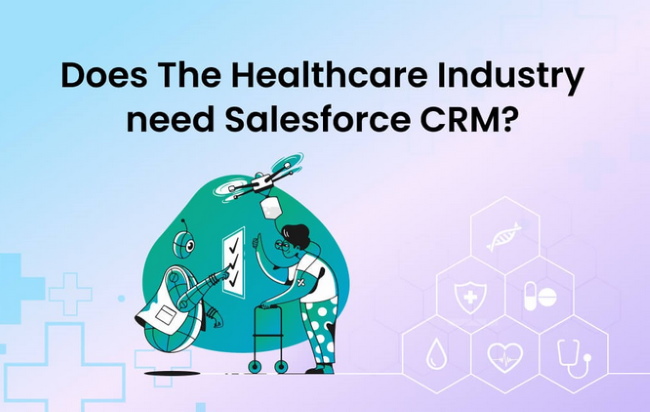Introduction on Salesforce CRM for Healthcare Industry
The world’s #1 CRM has a proven track record of assisting businesses in exceeding their sales targets. After all, half of its name is “sales.” However, the methods in which Salesforce boosts sales — through personalizing experiences, improving collaboration, and eliminating data silos — are applicable to more than simply sales.
The healthcare industry has recognized the value of a healthcare CRM with the debut of Salesforce Health Cloud in 2016. Salesforce enables care teams to collaborate more effectively and efficiently, improving patient-provider connections and, as a result, improving health outcomes. Salesforce’s ability to adapt quickly and accommodate a variety of healthcare use cases is further demonstrated by the Vaccine Cloud announcement.

Salesforce for Healthcare Industry: Why is it the right-fit?
Let us know more…
Healthcare is a wonderful profession in which patient care is critical. Salesforce health cloud enables healthcare enterprises and organizations to provide a wide range of benefits to their clients, resulting in increased patient happiness and better patient care.
Before you hire a Salesforce consulting firm to help you with Salesforce health cloud connection, you should know that the Health Cloud has a number of lightning component features. These qualities enable healthcare providers to provide the most efficient, tailored, and effective care and tracking of their patients’ health.
The Advantages of Salesforce Health Cloud
Health Cloud has a lot of integration options. Salesforce can effortlessly combine membership, insurance claims systems, EHR (electronic health records) solutions, and other applications, reducing the need to open several apps to get the whole patient profile. This, in turn, offers a number of benefits.
- In the cloud, all information about a single patient is saved in a single location. These files are password-protected and only those employees who have been granted access to them. As a result, a medical worker with access to the system can quickly obtain a single perspective of the patient’s medical history. Physicians can access care plans, timeframes, clinical and nonclinical data, and records in only a few clicks. Furthermore, the system allows for the sharing of this information with the patient, as well as the patient sharing certain information with their doctor.
- Salesforce Health Cloud has the ability to integrate with end users’ medical equipment and wearables, which is a huge plus. For example, a patient can configure their wearable gadget to send data from a healthcare app straight to the Cloud, allowing their care team to access it. This is especially beneficial for patients with diabetes, cardiovascular disease, epilepsy, and other chronic medical disorders, as well as the elderly, who require post-discharge care. Having the relevant information on hand all of the time can help hospitals and clinics cut down on wait times, which is critical for enterprises with high workloads. Furthermore, in urgent cases, quick access to a patient’s medical history can save a person’s life.
- People respect every technology that allows them to save time for crucial things in their lives as the speed of modern life accelerates. Of course, one’s health isn’t something to scrimp on, but if there’s a way to avoid going to the doctor’s office, standing in lines, and waiting for an appointment, few people will pass up the opportunity. Salesforce provides excellent prospects for telemedicine and home health adoption. Furthermore, the availability of virtual care choices may be a deciding factor for certain patients when selecting a healthcare provider.
- Medical organizations can use Health Cloud to better respond to and even predict patient demands. Custom assessments and surveys, as well as Einstein AI, are used to do this. Advanced predictive analytics algorithms enable patients to be segmented into groups and lists, risks to be identified, and particular services to be offered based on this knowledge. As a result, there are new chances to provide highly tailored treatment plans, elevating hospital and clinic service to new heights. Patient satisfaction rises dramatically as doctor-patient connections extend far beyond regular appointments.
- Salesforce offers a variety of solutions to help care teams work more efficiently. Task management, case management and monitoring, care plan administration, evaluations, mobile app connection, and a variety of other features are available. Salesforce Health Cloud can also be integrated with legacy EHR software and HL7 standards.
- Healthcare businesses place a high priority on data security. Breach can endanger patients’ safety and cost millions of dollars. Salesforce, fortunately, makes it simple for healthcare organizations to keep ownership of their data while being compliant with HIPAA and HITRUST. Healthcare businesses may ensure that electronic protected health information (ePHI) is secured and only accessible by authorized users using Salesforce Shield in conjunction with Health Cloud, as well as monitor user interactions and keep an audit trail of field data.
- Despite the fact that regulatory requirements are limiting by nature, Salesforce allows for innovation.
Final words
Salesforce Health Cloud is a sophisticated healthcare CRM with limitless potential for improving patient connections and improving the quality of medical services. However, in order to get the most out of the solution, it must be correctly set up, which includes connecting the Cloud into the medical organization’s existing software infrastructure and tailoring it to match the demands of the hospital or clinic through essential add-ons and tailor-made apps.
The AppExchange ecosystem allows security-conscious healthcare organizations to add functionality without sacrificing data protection, and the platform’s broad choice of native apps can make security vetting even easier. Healthcare firms can use AppExchange to improve their processes by using provider matching, telemedicine solutions, document management, and insurance verification apps, to name a few.
Does the healthcare industry need Salesforce CRM? ,




